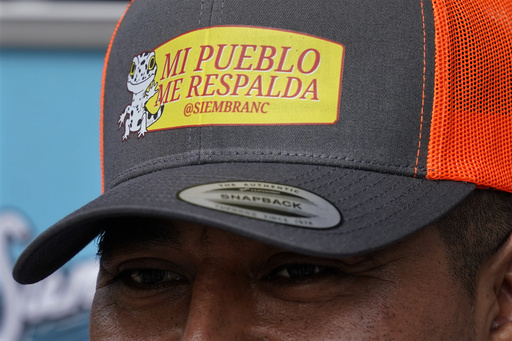
WASHINGTON — Progressive voter engagement organizations that gained momentum and enthusiasm following Vice President Kamala Harris’s nomination for President by the Democratic Party are gearing up to galvanize uncommitted voters of color as Election Day approaches.
Yet, many of these organizations are realizing there is still considerable work needed to familiarize voters with Harris and her policy positions. This challenge echoes the delayed start of her campaign and the earlier apprehension regarding the rematch between President Biden and former President Trump. Additionally, some of the difficulties highlight efforts by Republicans to connect with Black and Latino voters.
Groups like Siembra NC, which aims to uplift Latino communities in North Carolina, have discovered that numerous potential voters are opting to engage in local and state elections while leaving the presidential ballot blank. Many voters feel that state and local issues have a more direct impact on their everyday lives, and neither Trump nor Harris aligns perfectly with their presidential candidate preferences.
Kelly Morales, co-director of the organization, commented, “We need to engage in a lot of dialogues around building trust, which requires time.” She emphasized that abstaining from voting is, in itself, a political statement.
In late September, Siembra NC organized a voting mobilization event followed by a block party in Greensboro. During this event, conversations centered around labor policies, Harris’s stance on immigration, and Trump’s comments about the Latino community. They knocked on almost 1,000 doors and attracted attendees from several regions, showing great promise in their outreach efforts.
Both Harris’s and Trump’s campaigns recognize the importance of mobilizing voters of color, especially among Black and Latino men, as early voting progresses nationwide. This outreach acknowledges that the upcoming election will likely hinge on the votes from seven key swing states.
Many voter engagement organizations have experienced a revitalized spirit since Harris was nominated. At 59 years old, she stands more than 20 years younger than Biden, who is 81. If victorious, Harris would make history as the first Black woman, the first Asian American, and the first South Asian American to hold the presidency.
However, energizing undecided voters in battleground states remains a significant hurdle as the November 5 election draws near. “We must remember that excitement alone doesn’t guarantee results; we still need to motivate people to get out and vote,” stated Michael A. Blake, founder and CEO of KAIROS Democracy Project, which focuses on engaging young and minority voters.
According to activists, there are several barriers that complicate the voting landscape, including enactments of restrictive voting laws in various Republican-led states post-2020 election, efforts by conservative factions to purge voter rolls, and ongoing conflicts in the Middle East.
These challenges are particularly evident for groups like Asian Americans Advancing Justice in Atlanta, even amidst the initial excitement surrounding South Asian representation in the presidential race. Murtaza Khwaja, the group’s executive director, emphasized, “While there’s enthusiasm, there is also a strong request for accountability from whichever party holds power.”
In Texas, known for its closely monitored Senate contest, officials indicated that over 1 million individuals had been removed from voter registration rolls since 2021, raising concerns among outreach groups like Asian Texans for Justice about the potential disenfranchisement of eligible voters just before the election.
Language obstacles further complicate the voting process, as noted by executive director Lily Trieu. Recent statistics show a significant 63% increase in Texas’s Asian population since 2012, resulting in nearly 1.1 million eligible Asian American and Pacific Islander voters this year. Trieu remarked, “These new challenges have emerged in response to increasing enthusiasm among voters.”
Biden’s withdrawal from the presidential race this summer allowed Harris’s campaign to gain traction, leading to a surge in voter registrations, heightened volunteer involvement, and an influx of donations to progressive voter groups.
Voto Latino reported that, in the ten days following Biden’s exit on July 21, they registered over 50,000 new voters. In contrast, the advocacy group registered just 2,250 in July 2016 and 25,150 in July 2020. Over half of the latest registrants were in the 18 to 29 age bracket, with a substantial portion in key swing states like Arizona, North Carolina, and Florida, Trump’s home state. Voto Latino alone registered more than 11,000 Latino voters in Arizona, more than half occurring after Biden’s announcement.
Maria Teresa Kumar, president and CEO of the group, noted the crucial role of Kamala Harris in galvanizing young voters: “With enthusiasm organically rising among the youth, the focus should be on bridging the voting registration divide.”
Black fraternities and sororities, termed “The Divine Nine,” have notably supported Harris. Being a member of Alpha Kappa Alpha sorority during her time at Howard University, she has rallied support within these networks. At Spelman College in Atlanta, students participated in a voter registration drive hosted by Alpha Kappa Alpha and its sister fraternity, Alpha Phi Alpha, at Morehouse College nearby.
Taylor Kerr, the chapter president of Spelman, emphasized the importance of civic engagement among students while providing a platform to clarify voting processes. Caleb Cage, a 21-year-old student at Morehouse, expressed his enthusiasm, stating, “With Harris leading the ticket, there’s significantly more energy and engagement.”
After Biden’s withdrawal, Delta Sigma Theta, a historic Black sorority, launched its first paid advertisement highlighting Black issues such as bodily autonomy and the necessity of teaching Black history. The campaign targeted battleground states like Georgia and Pennsylvania, reaching over 200,000 potential voters, focusing on engaging men and infrequent voters, noted Elsie Cooke-Holmes, the sorority’s international president.
Cooke-Holmes emphasized the importance of mobilizing lower-propensity voters who may feel disenchanted with the electoral process. “It’s essential that we connect with our community and encourage participation in the vote,” she stated.
